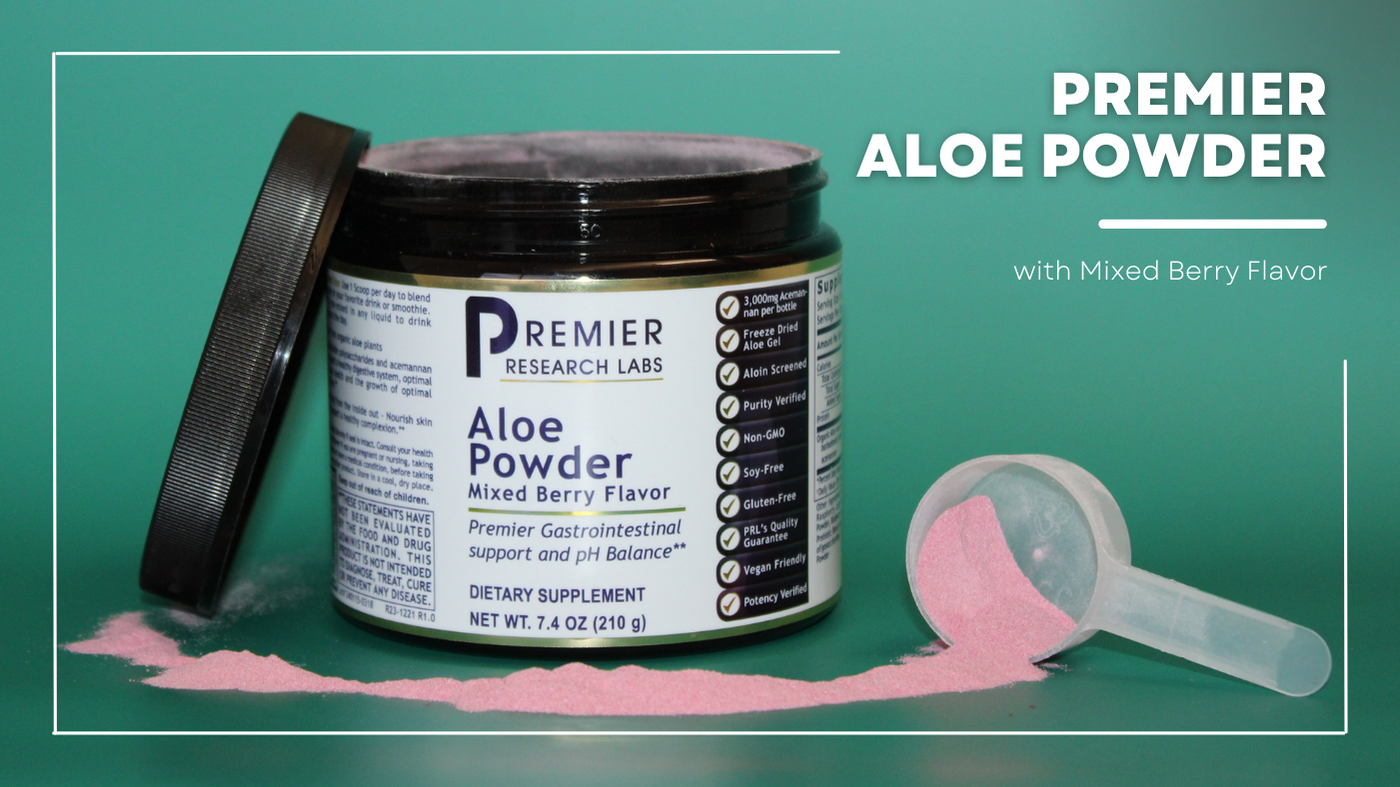
Unveiling the Healing Properties of Premier Aloe Powder
Premier Research Labs is pleased to be able to bring you our newest nutritional supplement: Premier Aloe Powder. This product leverages both aloe vera gel’s long history as a safe and effective traditional medicine and state-of-the-art processing technology to bring you a formulation that is unmatched in potency, effectiveness, and taste.
Tap into the soothing medicinal properties of Premier Aloe Powder and support the health of all tissue issues with this exciting new product.
What Is Aloe Vera?
Aloe vera (Aloe barbadensis) is a subtropical green succulent plant that belongs to the Asphodelaceae family, which also includes Alliums and Asparagus. Aloe plant leaves are made up of a spiny outer rind, a middle protective sap (latex), and an inner clear gel that consists of water, polysaccharides, amino acids, fatty compounds, vitamins, and other nutrients.
Aloe vera gel has been utilized for its medicinal properties dating back to the ancient Greek and Egyptians who relied on aloe topically, for skincare and burn and wound care, and internally for common digestive complaints like indigestion or constipation.1 Today, practitioners continue to turn to aloe’s inner gel in the management of several conditions, including burns, inflammation, dental plaque, diabetes, digestive stress, and skin disease.2,3
Consumers widely choose aloe vera as a topical home care remedy for sunburn, wrinkles, and acne. In recent years, the popularity of aloe vera drinks has exploded due to the growing body of research showing that aloe provides benefits not only when directly applied to the skin but also when ingested as a nutritional supplement.
What Makes Premier Aloe Powder Unique?
For more than 30 years, Premier Research Labs’ commitment to quality, purity, and potency has ensured satisfaction for practitioners and their clients. Our thorough methods to source, prepare, and test ingredients enable us to offer an aloe powder that is distinguished by the exceptional quality of its components, with antioxidant nutrients and tissue-soothing phytochemicals delivered in every dose.
Optimal Potency and Purity
Our organically grown and harvested inner-leaf aloe is immediately freeze-dried using proprietary methods that protect the aloe’s heat-sensitive nutrients and bioactive compounds. This innovative product is 200 times more potent than extracting aloe’s inner gel directly from the plant.. We perform nuclear magnetic resonance (NMR) testing to ensure that our aloe is derived from the pure, nutrient-filled inner leaf rather than the middle or outer layers of the aloe plant, which contain laxative-promoting anthraquinone glycosides and potentially harmful substances.
Fortifying Berries
Premier Aloe Powder offers the synergistic benefits of tissue-soothing aloe vera with powerful berries. Our formulation offers an array of delicious, polyphenol-packed fruits including concentrated black currant, raspberry, cranberry, and blueberry. Berries have been shown to support anti-inflammatory activity, possess antioxidant properties, and boost gut health.4 The pairing of powdered aloe vera with berries makes our product distinct in nutritional value, taste, and color and provides endless possibilities for mixing aloe vera-infused tonic beverages that are both nutritious and delicious.
Active Phytochemicals
Premier Aloe Powder possesses potent, concentrated compounds from the aloe vera plant. The main bioactive compounds in aloe vera are polysaccharides, with acemannan being particularly potent.5 Polysaccharides are large molecules that perform important biological functions and are found in certain plants, algae, and fungi.6 They are present in large quantities in aloe vera, and cellular studies have shown them to have immune-modulating, antioxidant, antiviral, anti-inflammatory, UV-protective, analgesic, and wound healing properties.5,7,8,9,10,11
The following table summarizes the primary polysaccharides present in Premier Aloe Powder and their biochemical roles as established through laboratory research.
| Polysaccharide | Mechanism of Action |
| Acemannan |
Promotes wound healing5 Exerts antiviral and antibacterial effects5 Possesses immunostimulatory properties5 Inhibits UV radiation damage5 Promotes antioxidant activity7 Contains prebiotic properties8 |
| Aloe-emodin | Induces apoptosis (natural cell death)9 |
| Aloesin | Promotes antioxidant activity10
Possesses anti-inflammatory properties10 Inhibits UV radiation damage10 |
| Emodin |
Possesses anti-inflammatory properties11 Exerts antibacterial effects11 Acts as an analgesic (pain-reliever)11 |
Benefits of Aloe Vera Supplements
Clinical studies of oral aloe vera supplementation demonstrate benefits across multiple dimensions of health. Current evidence suggests that drinking aloe vera’s inner gel may aid in digestion, mucosal or tissue health, diabetes, skin health, and general wellness.
Gastrointestinal Health
Aloe vera has been investigated as a treatment for irritable bowel syndrome (IBS), gastroesophageal reflux disease (GERD), and other digestive diseases with promising results.
- IBS. A meta-analysis of 3 studies showed that aloe vera supplements significantly improved IBS symptoms when compared with a placebo. Participants in the studies, took between 120 and 250 milligrams of aloe vera daily over 1 to 3 months.12 The successful results are attributed to aloe’s laxative, colon-stimulating, and inflammation modulating properties.
- GERD. In a study comparing aloe vera supplements to standard GERD medications (such as a proton pump inhibitor), researchers found that aloe vera reduced heartburn, belching, nausea, acid regurgitation, and other GERD symptoms and did not provoke side effects.13 The efficacy of aloe vera against GERD may be due to its ability to enhance nutrient absorption, soothe tissues and modulate inflammation as well as its activity against ulcer-inducing H. pylori as demonstrated in preclinical research.14,15
- Constipation. The compounds found in aloe vera are known to have laxative effects.5 Taking aloe vera orally is a traditional remedy for constipation in many cultures, and some clinical evidence supports its use in promoting bowel motility.2,16 Aloe products made from the whole leaf have more of a laxative effect than products derived from the inner leaf, like Premier Aloe Powder, which does not include the bowel-stimulating latex.
Oral and Gastric Mucosal Health
The mucosa, or mucous membrane, lines the insides of many organs, including those in the digestive system. This thin tissue layer protects the body from foreign pathogens and plays a role in the absorption of nutrients. In fact, Aloe vera is the only known supplement to act as a synergist, enhancing the absorption of antioxidant vitamins C and E.17 Aloe vera supports the health of the digestive mucous membrane through its antioxidant, anti-inflammatory, and antimicrobial properties. Acemannan, aloe’s primary phytocompound, also activates the immune system, stimulating the production of immune cells called cytokines and promoting nitric oxide release.18
Ulcerative colitis (UC) is a condition marked by chronic inflammation of the large intestine and is associated with immune system dysfunction.19 A randomized controlled trial showed 100 milligrams of aloe vera gel derived from the inner leaf to be an effective treatment for UC when compared with a placebo over 4 weeks.20 Aloe vera gel induced a clinical response in nearly half of participants and remission in 30% of participants in the study.
Although more research is needed, this evidence points to the potential for aloe vera’s tissue-soothing compounds to be efficient modulators of the chronic inflammation that underlies numerous mucosal disorders.
Metabolic Health
Aloe vera is a traditional herbal medicine extensively used to treat diabetes around the world, including in Mexico and the Arabian Peninsula.16 Though in an early phase of study, clinical research indicates that aloe vera may help with blood sugar regulation.
Two meta-analyses of randomized trials found that aloe vera supplementation may have beneficial effects in the management of prediabetes and early untreated diabetes. Participants who took varying doses of aloe vera supplements over 2 to 3 months showed healthier levels of fasting glucose and A1c.21,22 Some of the studies reviewed also indicated that, regardless of preparation method, aloe vera improved other metabolic measures like total cholesterol, triglycerides, low-density lipoprotein-cholesterol (LDL-C), and high-density lipoprotein-cholesterol (HDL-C).
Because the trials reviewed were small and had some limitations, more research is needed, but these results are very promising.
Skin Health
Aloe vera has been widely relied upon as a topical skin remedy for burns and other wounds. However, recent research points to aloe vera supplements derived from the inner leaf as tissue-soothing, nutritive remedies for reducing the signs of aging by promoting skin health as well. Skin aging is affected by chronological age and prolonged sun or UV exposure. A study in women over 45 years old found that 3 months of taking at 1,200 milligrams inner-leaf aloe powder per day resulted in significant improvement in facial wrinkles and skin elasticity, as well as a non-statistically significant increase in collagen presence.23
Although the mechanism through which aloe vera supports skin health is not well understood, researchers have suggested that it may be due to acemannan, one of aloe’s most extensively research polysaccharides, which possess immune-regulating properties.23 Additionally, aloe vera is known to activate cells called fibroblasts, which contribute to collagen synthesis.1
While further studies must be conducted to understand how supplementing with aloe vera may improve skin health, this initial research, combined with thousands of years of safe use, provides hopeful evidence.
Overall Health & Wellness
Preclinical research suggests other potential therapeutic avenues for aloe vera. In addition to acemannan’s general immunomodulatory support, it also acts as a prebiotic to support the gut microbiome.8,18 Early evidence also suggests that aloe’s bioactive compounds can act against specific viruses such as influenza, HIV, and herpes and may have potential as an inhibitor of the uncontrolled cell growth and replication that contributes to cancer.24,25,26,27 With additional research, scientists will be able to uncover exactly how the bioactive compounds in aloe vera leaf could play a role in promoting overall health and disease prevention.
Aloe Powder Considerations
Although aloe powder is packed with beneficial polysaccharides, it is also important to consider the potential drawbacks of the supplement for some clients. Experts recommend that people who are pregnant or breastfeeding avoid using aloe powder.25 Aloe powder may also be inappropriate for clients with abdominal pain, appendicitis, or intestinal blockage.25
Aloe vera powder is not known to cause serious harmful reactions. There have been reports of aloe supplementation being linked with carcinogenesis and toxicity; however, it’s important to note that these studies involved whole-leaf aloe vera products, which have not had potential impurities removed.28 Premier Aloe Powder is potent and pure, derived exclusively from the inner leaf of the aloe plant.
How to Use Aloe Vera Powder
In addition to the wide-ranging health benefits of supplementing with aloe powder, our berry-fortified formulation also tastes great, boosting client compliance. Premier Aloe Powder provides ample opportunity for your clients to create nutrient-rich and delicious aloe drinks while avoiding capsule fatigue (a sense of overwhelm that can occur when prescribed large numbers of capsule-formulated supplements). Try one of our favorite recipes below or create your own!
Aloe-ade
For a refreshing, hydrating, antioxidant-packed boost, mix the following ingredients in a cup, stir, and enjoy.
- 4 ounces filtered water (hot, room temperature or sparkling)
- 4 ounces organic lemonade
- 1 scoop Premier Aloe Powder
- 1-2 drops of pH Minerals OR a few sprinkles of pink sea salt (optional)
Aloe Water
A simple recipe for consuming all the nourishing benefits of our berry-fortified Premier Aloe Powder is to make flavored water. Mix water and aloe vera powder until the powder completely dissolves. Add ice until the mixture reaches your desired drinking temperature.
- 8 ounces filtered water (hot, room temperature or sparkling)
- 1 scoop Premier Aloe Powder
- Ice cubes (optional)
Energizing Aloe Juice
Kick aloe’s bioactive compounds up a notch by mixing aloe powder with polyphenol-rich pomegranate juice and energy-boosting B12. Combine the following ingredients in a cup and stir until powder completely dissolves.
- 8 ounces pomegranate juice
- 1 scoop Premier Aloe Powder
- ¼ teaspoon fermented B12 (optional)
Green Aloe Smoothie
Incorporate nutrient-dense spinach with fruit, antioxidant-loaded aloe powder, and nourishing honey for a healthful, filling treat. Add all ingredients to a blender and blend until smooth. Add ice cubes before or after blending for a colder drink.
- ½ cup pineapple, mango, or other fruit
- 1 banana
- 8 ounces organic spinach
- 1 tablespoon honey
- 8 ounces filtered water
- Ice cubes (optional)
With so many options for preparing Premier Aloe Powder, your clients are sure to enjoy not only the immune-supporting, digestive-modulating, and skin longevity-enhancing natural properties of aloe vera, but also its great taste and versatility.
‡ The products and claims made about specific products on or through this Site have not been evaluated by the United States Food and Drug Administration and are not approved to diagnose, treat, cure or prevent disease.
‡ This Site is not intended to provide diagnosis, treatment, or medical advice. Products, services, information and other content provided on this Site, including information that may be provided on this Site directly or by linking to third-party websites are provided for informational purposes only. Please consult accredited healthcare professional organizations, evidence-based herbal monographs, and published clinical research regarding any medical or health related diagnosis or treatment options.
References
- Surjushe, Amar et al. “Aloe vera: A short review.” Indian Journal of Dermatology, vol. 53, no. 4, 2008, pp. 163-6. https://www.ncbi.nlm.nih.gov/pmc/articles/PMC2763764/.
- About Herbs, Botanicals & Other Products. “Aloe vera: Purported benefits, side effects & more.” Memorial Sloan Kettering Cancer Center, 2023, https://www.mskcc.org/cancer-care/integrative-medicine/herbs/aloe-vera. Accessed 25 January 2024.
- National Center for Complementary and Integrative Health. “Aloe vera.” National Institutes of Health, 2023, https://www.nccih.nih.gov/health/aloe-vera. Accessed 25 January 2024.
- Vahapoglu, Beyza et al. “Recent studies on berry bioactives and their health-promoting roles.” Molecules, vol. 27, no. 1, 2021, https://www.ncbi.nlm.nih.gov/pmc/articles/PMC8747047/.
- Christaki, Efterpi, and Panagiota C. Florou-Paneri. “Aloe vera: A plant for many uses.” Journal of Food Agriculture and Environment, vol. 8, no. 2, 2010, pp. 245-9, https://www.researchgate.net/publication/265268175_Aloe_vera_A_plant_for_many_uses.
- Mohammed, Aiman Saleh A. et al. “Polysaccharides: Classification, chemical properties, and future perspective applications in fields of pharmacology and biological medicine.” Journal of Polymers and the Environment, vol. 29, no. 8, 2021, pp. 2359-71. https://www.ncbi.nlm.nih.gov/pmc/articles/PMC7838237/.
- Chou, Meng-Han et al. “Potential of methacrylated acemannan for exerting antioxidant-, cell proliferation-, and cell migration-inducing activities in vitro.” BMC Complementary Medicine and Therapies, vol. 23, no. 1, 2023, https://www.ncbi.nlm.nih.gov/pmc/articles/PMC10283281/ .
- Quezada, Maria Paz et al. “Acemannan and fructans from Aloe vera (Aloe barbadensis Miller) plants as novel prebiotics.” Journal of Agricultural and Food Chemistry, vol. 65, no. 46, 2017, https://pubs.acs.org/doi/10.1021/acs.jafc.7b04100.
- Şeker Karatoprak, Gökçe et al. “Advances in understanding the role of aloe emodin and targeted drug delivery systems in cancer.” Oxidative Medicine and Cellular Longevity, vol. 2022, 2022, https://www.ncbi.nlm.nih.gov/pmc/articles/PMC8789423/.
- National Center for Advancing Translational Sciences. “Aloesin.” National Institutes of Health, https://drugs.ncats.io/drug/Y27M69Y8ES. Accessed 25 January 2024.
- Stompor-Gorący, Monika. “The health benefits of emodin, a natural anthraquinone derived from rhubarb: A summary update.” International Journal of Molecular Sciences, vol. 22, no. 17, 2021, https://www.ncbi.nlm.nih.gov/pmc/articles/PMC8431459/.
- Hong, Seung Wook et al. “Aloe vera is effective and safe in short-term treatment of irritable bowel syndrome: A systematic review and meta-analysis.” Journal of Neurogastroenterology and Motility, vol. 24, no. 4, 2018, pp. 528-35. https://www.ncbi.nlm.nih.gov/pmc/articles/PMC6175553/.
- Panahi, Yunes et al. “Efficacy and safety of Aloe vera syrup for the treatment of gastroesophageal reflux disease: A pilot randomized positive-controlled trial.” Journal of Traditional Chinese Medicine, vol. 35, no. 6, 2015, pp. 632-6. https://pubmed.ncbi.nlm.nih.gov/26742306/.
- Bałan, Barbara Joanna et al. “Oral administration of Aloe vera gel, anti-microbial and anti-inflammatory herbal remedy, stimulates cell-mediated immunity and antibody production in a mouse model.” Central-European Journal of Immunology, vol. 39, no. 2, 2014, pp. 125-30, https://www.ncbi.nlm.nih.gov/pmc/articles/PMC4440021/.
- 15. Cellini, L. et al. “In vitro activity of Aloe vera inner gel against Helicobacter pylori strains.” Letters in Applied Microbiology, vol. 59, no. 1, 2014, pp. 43-8, https://pubmed.ncbi.nlm.nih.gov/24597562/.
- Foster, Meika et al. “Chapter 3: Evaluation of the nutritional and metabolic effects of Aloe vera.” Herbal Medicine: Biomolecular and Clinical Aspects. 2nd ed., CRC Press/Taylor & Francis, 2011. National Center for Biotechnology Information, https://www.ncbi.nlm.nih.gov/books/NBK92765/.
- Vinson, J. A. et al. “Effect of Aloe vera preparations on the human bioavailability of vitamins C and E.” Phytomedicine: International Journal of Phytotherapy and Phytopharmacology, vol. 12, no. 10, 2005, pp. 760-5. https://www.sciencedirect.com/science/article/abs/pii/S0944711305000656?via%3Dihub.
- Rahmani, Arshad H. et al. “Aloe vera: Potential candidate in health management via modulation of biological activities.” Pharmacognosy Reviews, vol. 9, no. 18, 2015, pp. 120-6. https://www.ncbi.nlm.nih.gov/pmc/articles/PMC4557234/.
- Crohn's & Colitis Foundation. "Overview of ulcerative colitis.” 2023, https://www.crohnscolitisfoundation.org/what-is-ulcerative-colitis/overview. Accessed 30 January 2024.
- Langmead, L. et al. “Randomized, double-blind, placebo-controlled trial of oral aloe vera gel for active ulcerative colitis.” Alimentary Pharmacology & Therapeutics, vol. 19, no. 7, 2004, pp. 739-47, https://onlinelibrary.wiley.com/doi/10.1111/j.1365-2036.2004.01902.x.
- Suksomboon, N. et al. “Effect of Aloe vera on glycaemic control in prediabetes and type 2 diabetes: A systematic review and meta-analysis.” Journal of Clinical Pharmacy and Therapeutics, vol. 41, no. 2, 2016, pp. 180-8. https://onlinelibrary.wiley.com/doi/10.1111/jcpt.12382.
- Zhang, Yiyi et al. “Efficacy of aloe vera supplementation on prediabetes and early non-treated diabetic patients: A systematic review and meta-analysis of randomized controlled trials.” Nutrients, vol. 8, no. 7., 2016, https://www.ncbi.nlm.nih.gov/pmc/articles/PMC4963864/.
- Cho, Soyun et al. “Dietary aloe vera supplementation improves facial wrinkles and elasticity and it increases the type I procollagen gene expression in human skin in vivo.” Annals of Dermatology, vol. 21, no. 1, 2009, pp. 6-11. https://www.ncbi.nlm.nih.gov/pmc/articles/PMC2883372/.
- Sun, Zhenhong et al. “Aloe polysaccharides inhibit influenza A virus infection: A promising natural anti-flu drug.” Frontiers in Microbiology, vol. 9, 2018, https://www.ncbi.nlm.nih.gov/pmc/articles/PMC6170609/.
- Ahlawat, Kulveer Singh, and Bhupender Singh Khatkar. “Processing, food applications and safety of aloe vera products: A review.” Journal of Food Science and Technology, vol. 48, no. 5, 2011, 525-33. https://www.ncbi.nlm.nih.gov/pmc/articles/PMC3551117/.
- Sydiskis, R J et al. “Inactivation of enveloped viruses by anthraquinones extracted from plants.” Antimicrobial Agents and Chemotherapy, vol. 35, no. 12, 1991, 2463-6. https://www.ncbi.nlm.nih.gov/pmc/articles/PMC245413/.
- Manirakiza, Astère et al. “Aloe and its effects on cancer: A narrative literature review.” The East African Health Research Journal, vol. 5, no. 1, 2021, pp. 1-16. https://www.ncbi.nlm.nih.gov/pmc/articles/PMC8291210/.
- Guo, Xiaoqing, and Nan Mei. “Aloe vera: A review of toxicity and adverse clinical effects.” Journal of Environmental Science and Health, vol. 34, no. 2, 2016, pp. 77-96. https://www.ncbi.nlm.nih.gov/pmc/articles/PMC6349368/.
Jenny Perez is an herbal educator, researcher, and writer who has been immersed in the field of nutrition and botanical medicine for more than 20 years. Jenny has created curriculum, content, and educational materials for Quantum Nutrition Labs, Premier Research Labs, the American Botanical Council, and Bastyr University’s Botanical Medicine Department where she was Adjunct Faculty, Herb Garden Manager, and Director of the Holistic Landscape Design certificate program.









